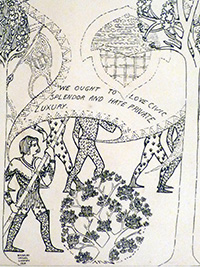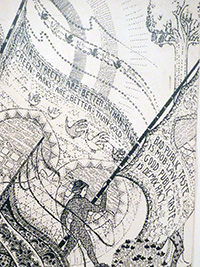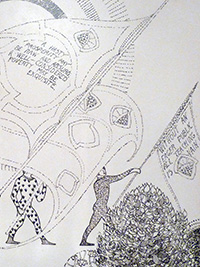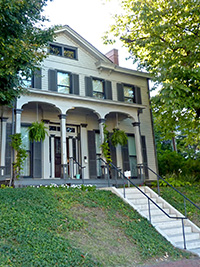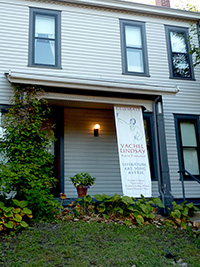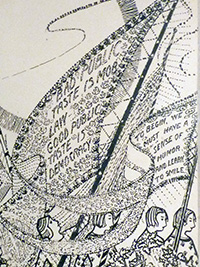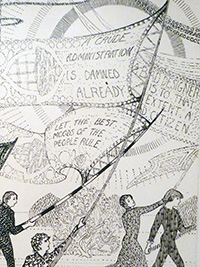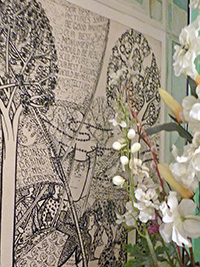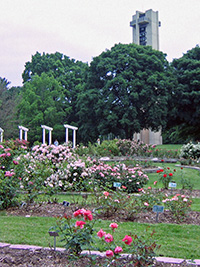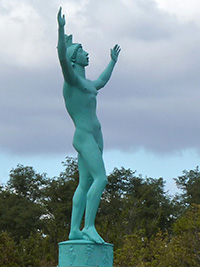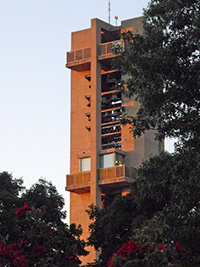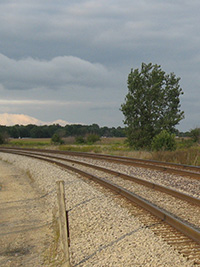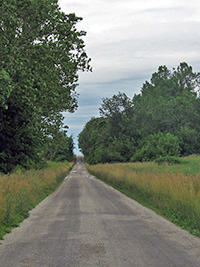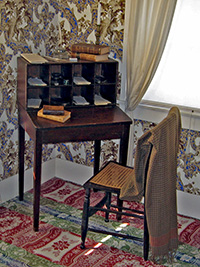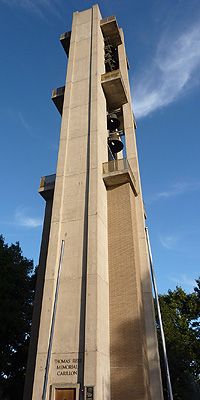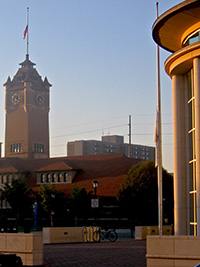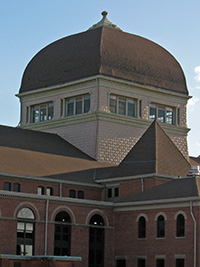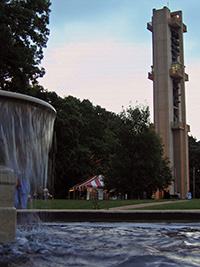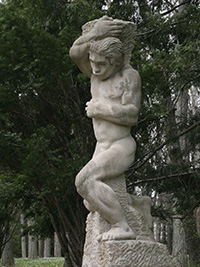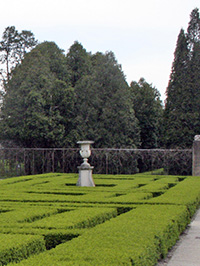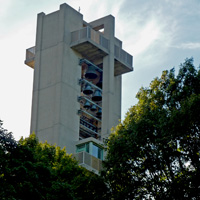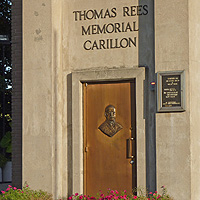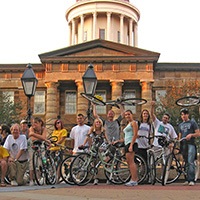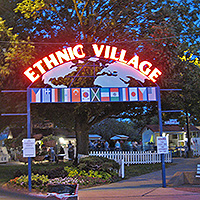OBJECTIVES The reasons you should read this article are:
|
Neighbourhood Guilds:
An Instrument of Social Reform (1892)
This is an excerpt of the first three chapters of Stanton Coit’s work suggesting a settlement house model as an effective way to address social problems related to poverty. The book draws on his experience founding (in 1886) and running the Neighborhood Guild (now the University Settlement House) in New York City. This was the first settlement house in the United States.
No one has as yet accepted, in the full sense in which he meant it, General Booth’s challenge to bring forward a better scheme than his for lifting the fallen classes of society into independence and prosperity. He demanded that over against the Salvation Army and the network of measures he had proposed, any one who refused to support him should not only point out other and better methods, but also another body of workers who were ready and competent to execute them. This no one of his opponents has done.
It is true that some clergymen have announced that the Church is the proper organisation to execute Mr. Booth’s suggestions, but they have said nothing to show that the Church will in any likelihood adopt the enterprise. In a similar manner the socialists insist that such a work should not be left in the hands of the Salvation Army; but they have not been able to point to any County Council or other local authority willing and able to carry out the scheme. Others, by fair and telling criticism, have shown up gross and dangerous defects, both in some important details and in the fundamental conception of Mr. Booth’s plan. While such critics have been chiefly negative and destructive in intention, there is, nevertheless, visible in the background of their arguments the outline of a counter-scheme. But they, too, fail to tell us who will apply their better method. The Secretary of the Charity Organisation Society cannot say, “I will supply an adequate corps of enthusiastic workers ready to put into practice the principles of reform I have laid down.” And Mr. Bosanquet, in his admirable criticism of Mr. Booth’s scheme, does not try to conceal his disappointment that the Salvation Army, which might have led out the unhappy denizens from Darkest England, has been set on the wrong track by its “General.” But the Army having failed him, Mr. Bosanquet leaves us without a hint of where to turn for rescue.
The Neighbourhood Guild does, I believe, solve the difficulty of getting the right men as well as the right measures. If it can do this, it deserves public attention. And that large class in the community who for religious or economic reasons have found themselves unable to sanction General Booth’s scheme may be glad to support another already successfully begun, which contains none of those elements of social danger felt to be inherent in the Salvation Army enterprise.
In the following pages the Neighbourhood Guild will be considered primarily as a scheme for getting the right men; only incidentally will the problem as to the right ultimate measures of industrial reform be dealt with. The former is the more pressing question of the hour. Were an adequate number of men systematically at work, attempting to understand and solve our agrarian and industrial difficulties, the just solution would be sure to dawn gradually upon the popular consciousness, and the new order be ushered in as noiselessly as the day. Whatever be the nature of the fundamental changes ultimately to be made in land-tenure, in taxation, and in the private ownership of the instruments of production, there must be a preliminary enlightenment of the great mass of the people in economic and social principles and aims, and a corresponding enthusiasm or disposition to bring about a juster order of life. But this enlightenment and the disposition to carry out specific radical reforms can only be brought about when the intellectual life of the people has been organised.
The first step in social reform, if my psychology be correct, must be the conscious organisation of the intellectual and moral life of the people for the total improvement of the human lot. Out of a comprehensive aspiration issue particular resolutions to reform life on definite lines by specific means. This is true of masses of men as well as of individuals. The organisation of the intellectual and moral life of the people is the crying need of our day. Because of the lack of it, our ideals and schemes are cold, abstract, bloodless things, or, at best, are impotent; they are like spirits without bodies, they cannot make themselves seen or felt or heard; they have no hands, nor feet, nor eyes, nor tongue. Were they the true deliverers, they would be utterly powerless, handicapped by lack of tangible substance—lack of hosts of men inspired by them. If this first step, the organisation of the masses mentally and morally, were taken, the second step, the enlightenment of the people in social principles, could be easily made, and then the realization of the just state would not be remote, nor would it be brought in with violence.
Now such a general organisation of the life of the people, and such a general civic instruction, are the special field of action which the Neighbourhood Guild would presume to assign to itself. How it could meet the requirements of the case, what its own internal principles and methods are, I shall attempt in these pages to point out. To do this it is not necessary for the writer to make any confession of faith as to the nationalization of land and capital. As to special measures, I shall simply assume that, whatever be the final and widest-sweeping reforms,—whether the wage system is simply to be modified or is to be superseded by a better method of production and distribution,—still the immediate line of advance will be through the organisation of all labourers, women as well as men, into trades unions, through a reduction of the hours of work, through friendly societies, through greater domestic conveniences and healthier surroundings, through better education in general, and through increased recreation and higher amusements. With these specific schemes of reform the Neighbourhood Guild is already allied. Presupposing their value and anticipating still more radical reforms, which for our present purpose may remain undefined as the secret of the future, I turn to consider the internal principles of the Neighbourhood Guild and its methods of work.
II. The Neighborhood Guild Defined—Its Credentials.
THE very name, Neighbourhood Guild, suggests the fundamental idea which this new institution embodies: namely, that, irrespective of religious belief or non-belief, all the people, men, women, and children, in any one street, or any small number of streets, in every working-class district in London, shall be or ganised into a set of clubs, which are by themselves, or in alliance with those of other neighbourhoods, to carry out, or induce others to carry out, all the reforms—domestic, industrial, educational, provident, or recreative—which the social ideal demands.
At the outset, a true insight into the spirit and methods of the Guild will perhaps be gained most readily by noting that it is an expansion of the family idea of co-operation. In the family all ages and both sexes meet mentally and morally, and do not limit their combination of effort to the attainment of any one special object in life, such as the mere physical comfort, or the health, or the financial convenience, or the intellectual development, or the sympathetic encouragement of one another; but all of these aims are pursued at once, and any one of them may become supreme as occasion demands, and each member receives the kind of help adapted to his present need.
The bad effects of forming societies of working people for any one object alone, however good in itself, seem (because they are indirect) to escape the notice of many would-be philanthropists. Such a society causes its members to magnify out of all proportion that one side of life or culture which it aims to develop. We have in all parts of London the melancholy spectacle of groups of people who are in this way made intensely narrow in their ideal of manhood. We may regard as typical the case of a club for young men in East London, which met twice a week for four years simply for the purpose of boxing. The Cambridge graduate, who organised and counselled this institution, was a man of the highest culture, appreciative of literature, a lover of art, a man filled with devotion to the community, but none of these characteristics did he betray or communicate to the young men he had rallied about him. They only knew him as a man fond of boxing. What to him was the most trifling thing in life became to them the absorbing object of interest, the centre and ground of friendship, the gauge and standard of manly excellence. The leading members of the club were continually tempted to quit amateur efforts and become professional boxers, even at the risk of losing their social status in the club.
Bookish pursuits, also, if followed exclusively, have a narrowing effect upon the members of a club. The same evil ensues if only recreation be the end in view, or any one reform or set of reforms, like that urged by the Anti-Vaccination Society or those proposed by the Social Democratic Federation. The principle of relative proportion in pursuits is a clear one. Boxing must have no more conspicuous place in the club-life than it deserves in a rational system of physical culture; while all bodily exercises together cannot be allowed to usurp time, attention, and enthusiasm, to the exclusion of sympathetic and intellectual occupations. If, in his own judgment, the organiser of the East End club of which I spoke, con. ceded a pre-eminence of worth to the study of Shakespeare or Darwin, as compared with high efficiency in boxing, then he should have intermingled these diverse interests. But neither should any lover of literature sacrifice the physical culture of the members of his club to the appreciation of the poets, nor should he interest them even in their own completest development to the neglect of the altruistic life. Every club, to be a healthy centre of social development, must also interest itself in the outside world and its needs. Industrial and political movements must claim its attention at the same time that it pays due regard to the physical and mental culture of its members.
In its social reform work the neighbourhood guild does not even limit its effort—as is be coming the fashion of the hour—to the rescue of those who have already fallen into vice, crime, or pauperism. Equally would it touch and draw to itself the whole class of self-supporting wage-earners, and not only with the object of preventing them from falling into these worst evils, but also of bringing within their reach the thousand higher advantages which their limited means do not at present allow them individually to attain. The supreme aim which it constantly keeps in view is the completest efficiency of each individual, as a worker for the community, in morals, manners, workmanship, civic virtues and intellectual power, and the fullest possible attainment of social and industrial advantages. Thus it includes the rescue of the fallen, though its preventive work is more conspicuous; and both these are subordinate to its effort to realize ideals of efficiency and culture higher than those now prevailing even among prosperous working men. But in pursuing the loftier aims, it must not be supposed to be quitting the rescue and preventive work; for no hard and fast line can be drawn between the former and these latter. The way to save and prevent is often by educating the intellect, and cultivating the taste of the person in danger or already fallen; and, again, the superior development of one member of a family or of a circle of friends may prove the social salvation of all the rest.
Lest so comprehensive a scheme seem fanciful, let it in the first place be remombered that the Guild may always point to the institution of the family as the tested experiment of a co-operative society pursuing as many aims as there are sides to human life itself. And in the second place, it must be remembered that to do almost all things for one person or a few persons is possible, whereas to do any one thing for everybody might be hopeless. Now any one Neighbourhood Guild for the most part concentrates its efforts upon the comparitively few people living in its immediate vicinity. Let it further be remembered, that while one Guild may reach only 500 people on all sides of their life, 500 Guilds would reach 250,000 people on all sides of their life. And 500 Guilds would not be many, if we consider the number of institutions of any one kind in London, as, for instance, the Board Schools, of which there are over 400. Again, it must be borne in mind that those privileges which no one Guild alone could attain, might easily be reached by the combined efforts of 1,000 Guilds.
A further reason for believing in the practicability of this scheme is the success which has attended the several attempts thus far made to carry it out. The first Guild was started about five years ago in one of the poorest and most crowded quarters of New York City. It has had as great success in the number of members and variety of enterprises under taken as its house-accommodations and finances would permit. At present it consists of six clubs and a kindergarten, and it has recently been accepted by the newly formed American University Settlement Association as their first settlement and centre of work. Another Guild has been started in Philadelphia, and another in Brooklyn, both of which have taken firm root and are flourishing. Two years and a half ago, a similar institution was started in London. It had its origin in a club consisting of eight working lads, meeting once a week in a private drawing - room. It now consists of five clubs and contains 230 members of all ages, representing less than 100 families. It has reached the limit which its present house-room can accommodate. It meets every evening at Leighton Hall, Leighton Crescent, Kentish Town, N.W. This building, which contains twenty-four rooms, and stands de- tached in a garden, besides being the home of the Guild, is also what is called a University Settlement, half of the house being used as a residence by a number of university graduates who devote leisure hours to the work of the Guild.
It is true that some of the most important work which the Guild aspires to do has not yet been undertaken. But the first months and years of such an institution must naturally be devoted to the organisation of its members and the inculcation of its principles into their minds. It is something, however, in two and a half years (to limit our consideration to the Guild in London), to have organised five clubs well, and through them to have founded a circulating library, Sunday afternoon free concerts, Sunday evening lectures, Saturday evening dances for members, a choral society, and fifteen to twenty classes in various branches of technical and literary education, and to have inspired the members of the Guild with the desire to plant new Guilds, and to push forward, as they are doing, at least one specific reform of general interest. To have done so little as this may seem to some readers no very strong credential for inducing the public to assist in the establishment of so wide a scheme as inspires the founders of the Guild. But if one considers the enormous disparity between General Booth’s few factories, shelters, homes, and labour intelligence bureau on the one hand, and the vast enterprise he has laid before the public on the other, one must see that the Neighbourhood Guild, as it is, does not fall short of its ideal any more glaringly than does the Salvation Army of its new ambition. Furthermore, the social reform wing of the latter is an undertaking for which the staff of the army have had no training whatever. They are, moreover, according to the frank admission of their leader, fully occupied with another kind of work, which they do not intend to abandon. As General Booth says of his new expedition, “My people will be new to it. We have trained our soldiers in the sav- ing of souls; we have taught them knee-drill; ... and that will ever continue the main business of their lives.... But the new sphere on which we are entering will call for new faculties other than those which have hitherto been cultivated, and for knowledge of a different character. ... Already our world-wide Salvation work engrosses the energies of every officer we command. With its extension we have the greatest difficulty to keep pace....” The Neighbourhood Guild, though comparatively small, may at least lay claim to being a body of people who have been trained in the special methods and principles which they now wish to apply on a vastly larger scale. Nor, again, may the actual achievement of the Guild seem so insignificant in comparison with its wider dream of future usefulness, when the sum of money for which it appeals to the public is known to be proportionately small. It asks for only £2,000 a year for ten years, instead of £100,000 to begin with, and £30,000 annually for ever after. For there are good reasons, as I shall show later, for believing that after ten years, with £2,000 a year. Neighbourhood Guilds could be fully self-supporting, and could propagate themselves without aid from the general public.
III. Locality in Cities as a Factor in Reform — Illustrated in Relief Work.
The new principle of organising the social life of all the people in one small district renders practicable many an enterprise which otherwise would be Utopian. One of the least merits of the Guild will be its power, when once it is established, of finding its financial support among those whom it directly benefits. Indeed, the idea of organising the whole social life of neighbourhoods may well be called a vital principle of reform, inasmuch as it gives life to many a worthy undertaking which other-wise languishes from lack of support and enthusiasm. And yet hitherto this principle has scarcely been entertained by reformers.
Dr. Chalmers appreciated better than anyone else had ever done, the influence of locality in cities as a charm and attraction to the philanthropic worker, and many have followed out his hints. His principle was that each benevolent lady or gentleman must have a special street or group of houses to visit, and visit regularly; then, affection for the place and the people would lighten the labour and transfuse it with pleasure. He also appreciated more than any one else had done, the vast amount of timely help, which in cases of distress and bereavement is constantly being administered with wisdom and tenderness, in the poorest districts, by the neighbours themselves. And so fully was he impressed with the worth and naturalness of such assistance, that he often waited until the last possible moment, before he would step in to apply aid from a distance—in order to give full chance for the spirit of neighbourly responsibility and service among the people themselves to express itself. But Chalmers’ scheme of philanthropy was after all aristocratic. While he would organise his rich parishioners into disciplined bodies of workers, he never seemed to think of developing and lifting out of its spasmodic and intermittent state that instinctive philanthropy to be found among the families of the labouring classes in any one street or house.
It is just this idea, however, which is the root principle of the Neighborhood Guild. Undirected and unorganised, the instinctive generosity of the working people is inevitably sentimental, fanciful, easily fatigued, and excited only by the most palpable forms of want. The poor as well as the rich need enlightenment in their charity; when awakened to responsibility and instructed, their impulsive kindness becomes a persistent principle of all-round care for one another; and if neighbourhood be linked to neighbourhood, each organised in its own guild, but all united in those efforts which are too comprehensive for any one to undertake alone, the whole life of the metropolis will be raised. And can it be raised in any other way?
If we consider the vast amount of personal attention and time needed, to understand and deal effectively with the case of any one man or family that has fallen into vice, crime, or pauperism, we shall see the impossibility of coping with even these evils alone, unless the helpers be both many and constantly at hand. The Report of the Poor Law Commissioners of 1832 pictures well the difficulties of such 20 Neighbourhood Guilds, efforts, in the following extract from the evidence given before them by the assistant over-seer of the Parish of St. George's, Southwark:
“Suppose you go to a man’s house as a visitor; you ask, Where is Smith (the pauper)? You see his wife and children, who say they do not know where he is, but that they believe he is gone in search of work. How are you to tell in such a case whether he is at work or not? It could only be by following him in the morning, and you must do that every day, because he may be in work one day and not another. Suppose you have a shoemaker who demands relief of you, and you give it to him on his declaring that he is out of work. You visit his place and find him in work; you say to him, as I have said to one of our paupers, ‘Why, Edwards, I thought you had no work?’ and he will answer, ‘Neither had I any, and I have only got a little job for the day, etc., etc.’”
This witness before the Commissioners sums up his conclusion in the following manner: “Unless you have a considerable number of men to watch every pauper every day, you are sure to be cheated.” Although there is exaggeration here, still one might say that in any neighbourhood formed into a local guild it would be possible to fulfil the demand for many friendly watchers to every person out of work. They would unavoidably be at his heels every night and morning, going and coming from work; they would be in shops and factories throughout the district; they would know where he spent his evenings and how, and would still have time for the pursuit of all the other aims of the guild besides.
But the need of detailed personal supervision over the applicants for work or food, clothing, medicine or shelter, may be best appreciated by considering the criticism of the Charity Organisation Society committee on the plan of giving free dinners to poor Board School children.
The following extract will help us to realize what a multiplicity of remedies is sometimes needed in one family in order to render efficient assistance.
“H—d. Father (aged 33 years), mother (30 years), and three children (six have died). A builder's labourer, earning 20s to 27s [about $90 to $130 in 2020] when in work, but losing a lot of time. Mother getting 6s [$30 in 2020] a week by washing. She is not a good manager, and the house is untidy. Both out of work at time of inquiry, everything pawned, 10s. 6d [about $50 in 2020] due for rent, and family subsisting on landlady's charity. The eldest girl, who had chest delicacy, was receiving one halfpenny meal a week.
“The Charity Organisation Society provided a letter to the Chest Hospital, cod-liver oil and medicine.
“The mother was out of health and suffering from varicose veins. Good food and an elastic stocking enabled her to continue her work. The father had a bout of rheumatism. He was not in a club, and had to call in the parish doctor. He thinks that an eight hours day would set matters right. But the immediate step seems to be that he should join a club, and that his wife should learn to manage.”
- First Report of a special Committee of the Charity Organisation Society appointed to consider the best means of dealing with Board School children alleged to be in want of food. Printed by Spottiswoode & Co., 1891, p. 7.
But admitting that the Charity Organisation Society principle is right, may not its advocates be blamed for not having gone a step further and devised some practical method of procuring the enormous number of workers which would be required in order to carry out their principle? Must not this abstract theory be joined to some concrete institution which can easily bring it into play, before it can become anything more than idle protest against every philanthropic undertaking? The Neighbourhood Guild, while accepting the abstract principle of detailed attention to every case of indigence, supplements this and renders it practicable by the principle, that every neighbourhood—but especially the poorest—should constitute itself its own Charity Organisation Society. Probably in the case of the family just cited, a dozen neighbouring families knew six months before the Charity Organisation Society stepped in, that the eldest girl had chest delicacy, that the home was untidy, that the mother was suffering from varicose veins, and that the father was not in a club. Now in a Guild, the neighbours would have learned that they must provide a letter to the Chest Hospital, cod-liver oil and medicine for the girl, good food and an elastic stocking for the mother, and by moral suasion must constrain the father to join a club, and must help to find him work.
This special function of gaining insight into the real needs of any family is, of course, fully met by Miss Octavia Hill's system of rent collectors. But in this matter the Guild does not set itself up as a competing system, but rather as a larger plan, comprehending the special methods which Miss. Hill has developed. Already the Guild in Kentish Town has applied to the landlord of the worst street in the district to be the rent collector from all the tenants. Miss Hill's method becomes infinitely more powerful for good when joined to the hundred other forces of the Guild, which make for social regeneration. There is also the same objection to be brought against her plan, as against Dr. Chalmers’—that it is aristocratic, that the regenerative work, instead of planting itself among the people themselves, and taking root there, is fed only from the upper classes of society. If for no other reason than this, it must collapse before many years, just as Chalmers’ scheme did. Surely the history of the working classes proves that any thorough reform of their social life must rest in a movement from within their own ranks, however much it may need the time and attention of a few men and women of leisure at its inception.
Another superiority of neighbourhood philanthropy over the friendly visitations of ladies who live an hour’s distance away, lies in the fact that only neighbours can know without prying! Mere unexpected and unplanned accident will disclose to them what others cannot discover without impertinence. Even the rent-collector coming once a week for a half hour or less on an errand not always agreeable to the tenant, must suffer embarrassment on this score. I know from two years’ experience on a Charity Organisation Society committee and from frequent visits to the needy, that a more than Jesuitical tact is required to find out the facts and not be grossly inquisitive. I know that many a family has been suspected by its neighbours, on account of the smiling, would-be vague, inquiries put to them by the Charity Organisation Society’s agent. But if the neighbours already know, or can know without, offence, why should not they be summoned to relieve as well as to give testimony? Let it not come into any one’s mind as an objection that the poor neighbours could not afford to confer material relief of the kind that the “friendly visitor” gives; for neither do the staff of the Charity Organisation Society or of any other charitable institution give the relief out of their own purse. But it has not yet been proved that even the poorest neighbourhood would be unable to look after its own destitute. I believe that it would be able. And if money from the rich were needed, it would be only for intellectual and artistic luxuries.
Then, again, charitable relief is quite free from the tendency to pauperize, only when given by those exposed to poverty. Only the man who can truthfully say to me, “I may be thrown out of work next month, or I may fall ill, and then it will be your turn to help me,” can give me food or money and not lower my independence.
But more than by any other circumstance, is the sting taken out of all relief given in the Neighbourhood Guild by the fact that here the assistance is only an incidental and not the main occasion of the organisation. How grim a commentary upon the social life of the poor is it that they unite almost exclusively to procure funeral privileges and sick-money, and help when they are out of work! But how tender and unobtrusive such assistance, where neighbours are already knit together by a thousand high associations in play and song, in pursuit of the intellectual ends of life, in the enjoyment of art, literature, music, conversation, and nature! It is terrible when men draw together only in suffering; whereas those who have laughed and thought together, and joined in ideal aims, can so enter into one another’s sorrow as to steal much of its bitterness away. The direct relief of the needy is happily not the prime object of the Neighbourhood Guild.

